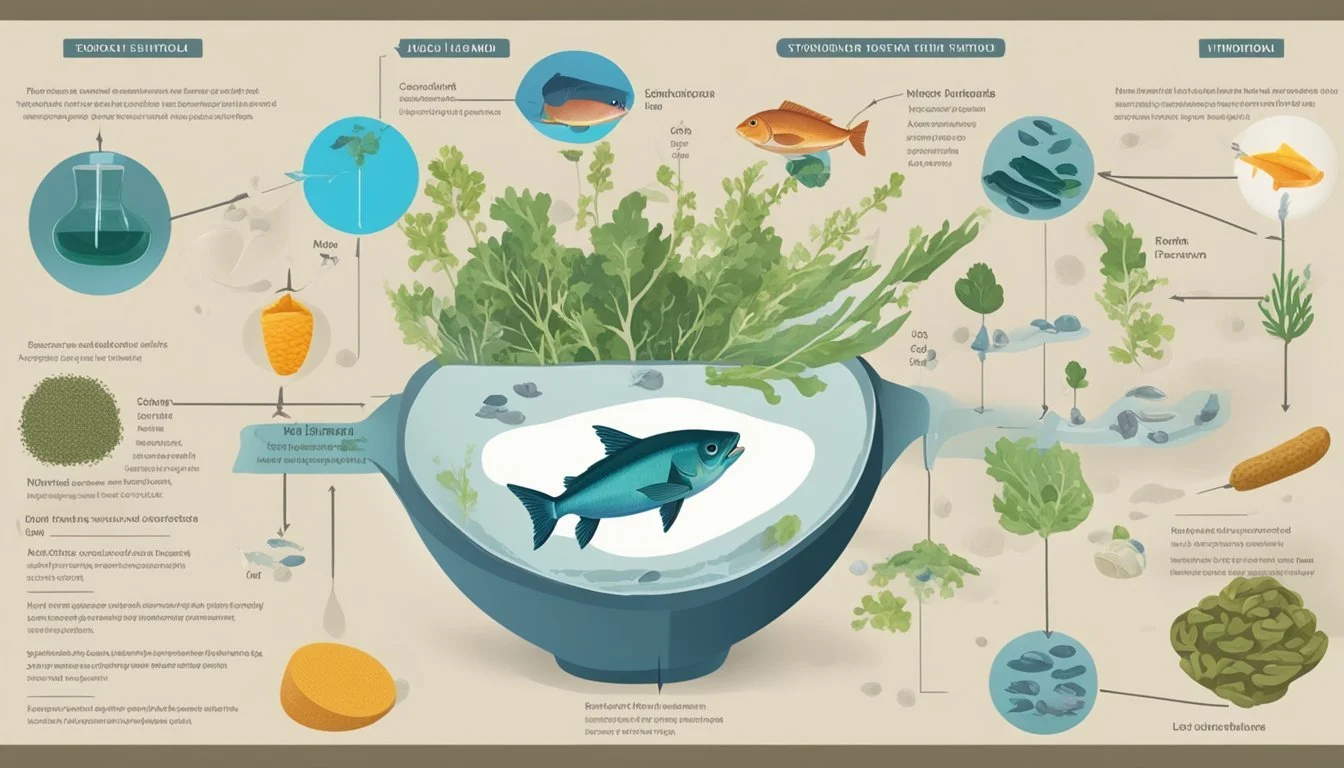How Much Iodine-Rich Foods Are Essential for Optimal Thyroid Health?
Iodine is an essential mineral that plays a pivotal role in thyroid function. The thyroid gland depends on iodine to produce thyroid hormones, which are critical for regulating metabolism, growth, and development. A deficiency in iodine can lead to thyroid gland issues, including hypothyroidism, where the gland is underactive and does not produce sufficient hormones for the body's needs. Maintaining an adequate intake of iodine-rich foods is therefore crucial for overall health and well-being.
Fish such as cod, halibut, and pollack, as well as dairy products, seaweed, beans, and certain fruits, are known to be good dietary sources of iodine. The amount of iodine in fish can vary based on factors such as whether it is wild-caught or farm-raised and the location from which it is sourced. For example, cod typically contains about 158 micrograms (mcg) of iodine per serving, while pollack may offer as much as 1,210 mcg per serving. It's essential for individuals to consume enough iodine to support healthy thyroid function, but intake must be balanced as excessive consumption can lead to conditions such as hyperthyroidism.
The recommended daily intake of iodine varies by age, gender, and life stage, with adults requiring 150 mcg of iodine per day, while pregnant and lactating women need more to support fetal and neonatal development. Yet, it is possible to meet these requirements through a balanced diet, and for most people, supplementation is not necessary if they consume a variety of iodine-rich foods. The importance of iodine for thyroid health underscores the need for a well-rounded diet that ensures adequate intake of this vital mineral.
Essential Role of Iodine in Thyroid Health
The thyroid gland's health hinges on adequate iodine intake, as it's crucial for the production of thyroid hormones. Insufficient iodine can lead to thyroid dysfunction, affecting a host of bodily functions.
Understanding the Thyroid Gland
The thyroid gland is a butterfly-shaped organ located in the front of the neck, responsible for producing hormones that regulate the body's metabolism. The synthesis of these hormones requires iodine, an essential trace mineral that the body cannot produce on its own.
Thyroid Hormones and Their Functions
Two key hormones produced by the thyroid gland are thyroxine (T4) and triiodothyronine (T3). T4 is converted into the more active T3 within the body, and together they play a pivotal role in regulating metabolism, heart rate, and temperature. The production of these hormones is controlled by the thyroid-stimulating hormone (TSH), which is released by the pituitary gland.
Iodine Deficiency and Thyroid Dysfunction
An iodine deficiency may lead to a spectrum of thyroid disorders, from mild enlargement of the gland (goiter) to severe hypothyroidism or hyperthyroidism. Iodine deficiency during pregnancy can result in thyroiditis in mothers and developmental issues in infants.
Recommended Daily Intake for Iodine
The recommended daily intake (RDI) of iodine varies with age and life stage:
Children 4-8 years: 300 mcg
Children 9-13 years: 600 mcg
Adolescents 14-18 years: 900 mcg
Adults 19 years and older: 1,100 mcg
Pregnant women: higher intake is crucial due to the increased demand for thyroid hormones
The RDI signifies the optimal iodine intake necessary to ensure the thyroid gland functions effectively, avoiding deficiency or excess.
Dietary Sources of Iodine
The thyroid gland relies on iodine from dietary sources to produce hormones essential for bodily functions. Seafood, dairy, certain plants, and iodized salt are key sources of this trace mineral.
Seafood and Iodine Content
Fish are significant sources of iodine, with cod providing approximately 158 mcg per serving, while halibut offers about 18 mcg per serving. Shellfish, like oysters, contain up to 93 mcg in just three ounces. Seaweed, such as kelp, exhibits high iodine levels, making it a staple for those seeking iodine through a varied diet.
The Impact of Dairy Products on Iodine Levels
Dairy products, including milk, cheese, and yogurt, contribute to iodine intake. The content can vary based on factors such as the iodine in cattle feed and processing methods. For instance, a cup of milk can range from 56 to 100 mcg of iodine.
Iodine in Plant-Based Foods
While plant-based foods generally have less iodine than animal sources, they still play a role. Soy, certain vegetables like cabbage and broccoli, and fruits, notably prunes, can contribute to meeting iodine needs, especially important for those following a vegan diet.
Iodized Salt and Iodine Fortification
Iodized salt is a reliable source of iodine, particularly in regions where other sources are scarce. The addition of iodine to salt – a process known as fortification – has drastically reduced the prevalence of iodine deficiency. It's important to note that sea salt often lacks significant levels unless specifically fortified. Additionally, some types of bread and dairy products are fortified with iodine to help reach the daily required intake.
Beneficial Habits for Maintaining Iodine Levels
Maintaining optimal iodine levels is essential for thyroid function, which in turn supports metabolism, heart health, and overall development and growth. Establishing beneficial habits for iodine intake can protect against deficiencies and promote wellbeing.
Adequate Iodine Intake in Various Life Stages
The National Institutes of Health (NIH) recommends different iodine intake levels based on life stages. Pregnant and breastfeeding women, in particular, have higher requirements due to the role of iodine in fetal and infant development.
Pregnancy: 220 micrograms (mcg) per day
Breastfeeding: 290 mcg per day
Infants (0-6 months): 110 mcg per day
Children (1-8 years): 90 mcg per day
Adolescents (9-18 years): 120-150 mcg per day
Adults: 150 mcg per day
These recommended daily intakes contribute to thyroid hormone production, which is crucial for cellular function and organ system regulation.
Balancing Diet and Iodine Supplements
The body does not naturally produce iodine, so it must be obtained from diet or supplements. Iodine-rich foods include:
Seafood: Shellfish (e.g., shrimp, crab) and fatty fish (e.g., tuna)
Dairy products: Milk, cheese, and yogurt
Seaweed: Varieties such as wakame, nori, and kelp
Beans: Rich in micronutrients and can contribute to iodine intake
In cases where dietary sources are insufficient, especially in areas where soil lacks iodine, supplements may be necessary. However, they should be taken judiciously to avoid excess, potentially leading to thyroid dysfunction.
Recognizing and Avoiding Goitrogenic Foods
While ensuring sufficient iodine intake, it's equally important to be mindful of goitrogenic foods, which may interfere with iodine uptake and thyroid function. Foods containing goitrogens include certain raw vegetables like cabbage, broccoli, and cauliflower. Proper cooking methods can help reduce their goitrogenic properties. Additionally, maintaining adequate intake of essential minerals such as iron, magnesium, selenium, and zinc, and vitamins like vitamin A, vitamin B12, and vitamin D, supports thyroid health and is beneficial for overall balance.
Health Implications of Iodine
Iodine is an essential micronutrient, integral for the synthesis of thyroid hormones, which are critical for brain development, metabolic regulation, and reproductive health. An imbalance can lead to issues such as hypothyroidism or hyperthyroidism with wide-ranging health implications.
Iodine's Role in Brain Development
Iodine is crucial for prenatal and early childhood brain development. Pregnant women with iodine deficiency can jeopardize their child's brain development, potentially resulting in learning difficulties or intellectual disabilities. The body uses iodine to make thyroid hormones, which help guide the brain's maturation process during gestation and infancy.
Thyroid hormones:
Thyroxine (T4)
Triiodothyronine (T3)
Essential timeframes for iodine sufficiency:
Pregnancy
Infancy
Early childhood
Effects of Iodine on Metabolism and Weight
Thyroid hormones, regulated by iodine, play a significant role in maintaining a balanced metabolism. Insufficient iodine can lead to hypothyroidism, often presenting symptoms such as fatigue and weight gain. Conversely, an excess of iodine may contribute to hyperthyroidism, potentially causing weight loss and disrupting overall metabolic function.
Common thyroid-related metabolic issues:
Hypothyroidism: Can cause weight gain and a slower metabolism
Hyperthyroidism: May lead to weight loss and an accelerated metabolism
Iodine and Reproductive Health
For reproductive health in men and women, the presence of adequate iodine levels is necessary. Hormones produced by the thyroid using iodine are vital in ensuring reproductive organs function effectively. Iodine deficiency in pregnant women is particularly critical as it can profoundly affect the development and health of both the mother and child, potentially causing complications such as goiter and developmental issues.
Key aspects of iodine in reproductive health:
Fertility
Pregnancy health
Fetal development
At-risk groups:
Women of childbearing age
Pregnant women
Thyroid Disorders and Treatment
Thyroid function is critically dependent on the right balance of iodine intake because it's a key component in the synthesis of thyroid hormones. Treatment of thyroid disorders typically addresses the modulation of these hormones and the correction of iodine levels.
Dealing with Hypothyroidism and Hyperthyroidism
Hypothyroidism, a condition where the thyroid produces insufficient thyroid hormones, can affect approximately 11.7% of U.S. adults. It leads to a range of symptoms including fatigue, weight gain, and cold intolerance. Typical treatment involves the administration of synthetic thyroid hormone levothyroxine to restore proper hormone levels. On the other hand, hyperthyroidism results from an overactive thyroid, producing excess hormones. Treatment options may include antithyroid medications, radioactive iodine to reduce thyroid function, or even thyroid surgery, in severe cases.
Thyroiditis and Its Association with Iodine
Thyroiditis refers to inflammation of the thyroid, which can be associated with both hypo- and hyperthyroidism, and sometimes iodine levels play a role. Forms of thyroiditis include Hashimoto's thyroiditis, where the immune system attacks the thyroid, potentially due to the iodine imbalance, and subacute thyroiditis, which is often triggered by a viral infection.
Thyroid Medication and Iodine Supplementation
When it comes to the relationship between medication and iodine supplementation, it's important to note that not all thyroid dysfunction is caused by iodine deficiency. Therefore, while iodine-rich foods and supplements may benefit people with iodine deficiencies, for others, particularly individuals with existing thyroid conditions or a history of iodine deficiency, excessive iodine can exacerbate thyroid dysfunction. Healthcare providers measure thyroid-stimulating hormone (TSH) levels to monitor thyroid function and oversee the necessity and extent of supplementation.
Hypothyroidism: Levothyroxine (synthetic hormone)
Hyperthyroidism: Antithyroid drugs, radioactive iodine, surgery
Iodine supplementation: Only when deficiency is evident
The approach to treating thyroid disorders is highly individualized, taking into account the unique thyroid hormone levels and iodine status of each person.
Global Perspectives on Iodine Consumption
The consumption of iodine is crucial for maintaining thyroid function, with varying intake levels observed globally. Strategies to prevent iodine deficiency have been implemented in many regions, reflecting the recognition of iodine's importance in human health.
Iodine Intake Trends in the United States
The average American adult typically consumes 150 micrograms of iodine per day, an amount that meets the National Institutes of Health recommendations for iodine intake. The introduction of iodized table salt has played a significant role in ensuring sufficient iodine consumption among the general population. However, reliance on processed foods, which may not always contain iodized salt, can result in fluctuating intake levels. The American Thyroid Association monitors these trends and advises on necessary adjustments to dietary guidelines to counteract potential deficiencies.
Iodine Deficiency in Different Parts of the World
In various global regions, iodine deficiency remains a concern. Some countries may have reduced access to iodine-rich foods like fish, dairy, and seawater-derived products. In addition, areas with iodine-depleted soil experience lower iodine levels in crops, further complicating efforts to meet daily intake recommendations. These deficiencies can lead to health issues, including goiter and cognitive impairments, underscoring the need for targeted intervention programs.
Strategies for Iodine Deficiency Prevention
Efforts to prevent iodine deficiency have been diverse and country-specific. For example:
Fortification Programs: These involve adding iodine to salt, known as potassium iodide or potassium iodate, ensuring its wider distribution even in processed foods.
Public Health Campaigns: Aimed at educating the population about the importance of iodine, these initiatives often involve healthcare providers like dietitians advocating for a balanced intake of minerals.
Monitoring Iodine Levels: Institutions like the National Institutes of Health periodically review iodine consumption patterns to identify regions or groups at risk of deficiency.
These strategic approaches are designed to combat iodine deficiency and promote thyroid health on a global scale.
Common Questions and Myths about Iodine
Iodine is a crucial mineral for thyroid health, but misconceptions often surround its dietary intake and impact. This section unravels some of the most common myths and provides clarity on iodine-related concerns.
The Truth about Iodine and Thyroid Health
The thyroid gland requires iodine to produce hormones that are essential for metabolism and growth. A lack of iodine in the diet can lead to a condition known as goiter, where the thyroid gland enlarges. The Recommended Dietary Intake (RDI) of iodine for adults is 150 micrograms daily, which can be met through consumption of iodine-rich foods such as fish, dairy, and iodized salt. Vegetables and fruits can also contribute to iodine intake, though to a lesser extent.
Addressing Concerns about Iodine Overconsumption
Although essential, excessive iodine can be harmful and may lead to hyperthyroidism—a condition where the thyroid produces too much hormone. It's important for individuals to not exceed the upper limit of 1,100 micrograms for adults, as established by health authorities. Notably, the risk of overconsumption is typically linked to excessive intake of iodine supplements rather than dietary sources like iodized salt or food.
Iodine in Pregnancy and Breastfeeding
During pregnancy and breastfeeding, a woman's iodine requirements increase to 200 micrograms per day to support fetal and neonatal development. It is imperative for pregnant and breastfeeding women to monitor their iodine levels to prevent deficiencies, which could impact the baby's brain development. However, they should also be cautious to avoid an excess of this mineral, which can be just as detrimental. Consulting a healthcare provider for personalized guidance on iodine consumption through diet and supplements during these stages is advisable.






